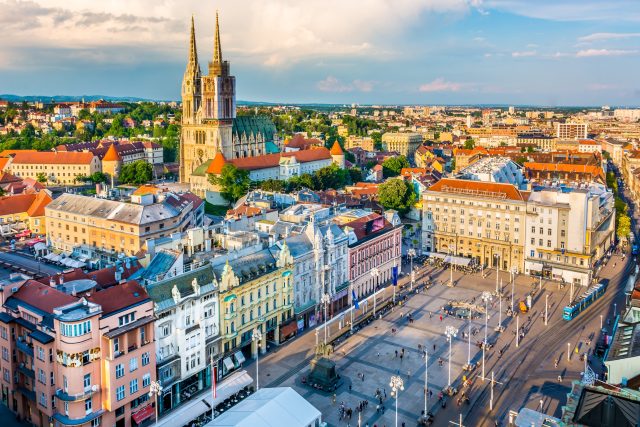
European Diary: Zagreb, May 2022
Zagreb is one of the pleasant Central European cities of the Habsburg Empire, with a cathedral, many other churches, and market squares, ensuring that both the spirit and the flesh were served. It lies like Slovenia’s Ljubljana and Serbia’s Belgrade on the banks of the Sava River, the largest tributary of the Danube. The city dates back to 1094 when the Hungarian king founded a diocese there, and in 1557 Zagreb became the capital of the Kingdom of Croatia which was in a personal union with the Kingdom of Hungary, under the Habsburgs. Previously, Croatia had, between 925 and 1102, been an independent kingdom. It is important to the Croatians, I sensed during a visit to Zagreb in May 2022, that their country has been largely autonomous and reasonably defined as a political unit for more than a millennium. The country has had a diet, Sabor, since 1273. It became an elected parliament in 1848, and was only interrupted between the two world wars of the twentieth century when the artificially created Yugoslavia was a unitary state. In the autumn of 1991, Zagreb became the capital of the independent state of Croatia which joined the North Atlantic Treaty Organisation, NATO, in 2009 and the European Union in 2013.
Aquinas on Private Property and Victimless Crimes
Croatia is a catholic country and the two spires of the cathedral dominate the Zagreb skyline. To me it seemed appropriate therefore briefly to discuss catholicism and capitalism, in my contribution to a seminar 11 May 2022 in Zagreb, organised by the Zagreb School of Economics and Management and the Austrian Economics Center. I argued that catholicism and capitalism were quite compatible, recalling the cogent defence of private property rights presented by St. Thomas Aquinas in Summa Theologica: Individuals will attend more carefully to what is theirs than to what is everybody’s; and human affairs will be more orderly if things belong to particular people. Instead of fighting over land and cattle, the land is fenced off and the cattle branded.
I also mentioned the argument of the philosopher-saint about sin: Man is indeed a frail being, a potential sinner, Aquinas recognised, and accordingly government should concern itself only with those sins which are harmful to others, such as theft and physical violence, and leave alone other sins, today often called victimless crimes. I pointed out that two of the most distinguished representatives of what I have identified as the conservative-liberal political tradition were devout Catholics, Alexis de Tocqueville and Lord Acton. In my recent book in two volumes, Twenty-Four Conservative-Liberal Thinkers, I devoted chapters to Aquinas, Tocqueville, and Acton.
Meeting Thatcher’s Biographer
Other speakers at the seminar were American businessman Terry Anker on entrepreneurship, Croatian Finance Professor and investor Andrej Grubišić on economic opportunities in Croatia, Croatian Economics Professor Vedrana Pribicević on preconditions for economic growth in Croatia, British-Croatian writer Dr. Robin Harris on Croatia and the European Union, Austrian economist Dr. Barbara Kolm on monetary regimes in small countries, American Professor Christopher Lingle on the case for the free market, Croatian financial strategist Dr. Neven Vidaković on necessary reforms in Croatia, American writer Craig Biddle on individualism (as interpreted by American novelist Ayn Rand), Canadian-Croatian accountant John Gasparac on doing business in Croatia, and Croatian businessman Damir Vanđelić on the prospects for economic growth in his country. The discussion was lively and instructive.
After the seminar, Croatian political philosopher and MP Dr. Stjepo Bartulica took the speakers on a tour of the Croatian Parliament and the premises of his think tank, Center for the Renewal of Culture. He offered many insights into Croatian politics. At a subsequent drinks party at the Center, I had the pleasure to sit down with Robin Harris and chat with him about the personality and policies of Margaret Thatcher on whom Harris had written a book, Not for Turning: The Life of Margaret Thatcher (2013). After earning a doctorate in modern history at Oxford University, he had, during Thatcher’s tenure, been Director of the Conservative Research Department and subsequently a member of the Prime Minister’s Policy Unit. Later, Harris had helped her with writing her memoirs in two volumes and with her book, Statecraft: Strategies for a Changing World. His biography is an excellent introduction to Thatcher’s life and legacy.
I had myself met Thatcher on several occasions, and I remember a dinner with her In London (in 2002) where she exclaimed: ‘The problem with the Brussels bureaucrats is that they do not understand the Anglo-Saxon tradition of liberty under the law.’ I would only add that liberty under the law is also a Nordic tradition, about which I am presently writing a book. Indeed, a strong legal tradition enabled the Nordic nations to withstand the aggression both of kings in the seventeenth and eighteenth centuries and of social democrats in the twentieth century, all of them trying to extend the discretionary power of government, always of course in the name of the common good.



 Subscribe
Subscribe